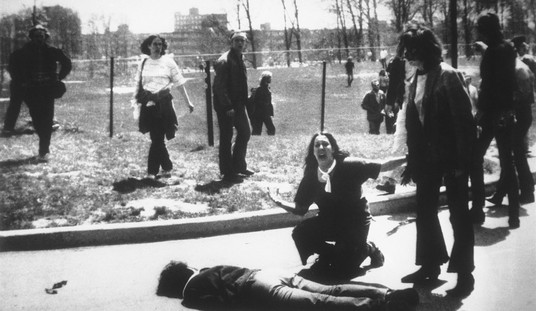Now that we are into the second week of the new year, it seems that those pesky resolutions are starting to shake themselves out. Some resolutions have already been abandoned. Some are still going strong. And there might even be some of those profound ones that you strive to cling to as the year progresses, that aren’t so easily attained or forgotten the first few days after Time’s Square has cleared out. One such resolution has—strangely enough—been brought to my attention by an extremely unlikely scenario and group of players.
The AP reported recently that the Democratic presidential nominee, Mrs. Hillary Clinton herself, will be attending the upcoming inauguration of President-elect Donald Trump. Some claim it’s just tradition or courtesy that former presidents and first ladies are present on the inaugural platform for the historic event, and that could very well be the case. But whether out of respect for the office or just plain concession after losing a shocking battle to her bitter rival, Hillary Clinton is setting aside a portion of pride and attending the ceremony of a man whom many feel is the devil incarnate. So, what does this have to do with resolutions?
Forgiveness. Or, well, at least letting go of hatred and anger.
I’m not suggesting former Secretary of State Clinton has necessarily forgiven the president-elect for the negative ads he ran, for the derogatory and misogynistic things he has said about women in general, or the myriad of other things he has done to offend and hurt millions upon millions of people. And I’m certainly not suggesting an example of two divided political parties and their severely diverse candidates is directly applicable to this readership. But what I will state is that we live in an imperfect world, full of human faults. For millennia past and generations to come, mistakes will be made and injustices will occur. There is not a single human being on this earth that can avoid becoming the victim of someone else’s careless actions, hurtful conduct, or even sinful behavior. That is one of the universal commonalities we all share.
It seems another intrinsic human fault is to become angry after we’ve been wronged—and then hold onto that anger as steadfastly and fervently as we can. Hurt leads to anger, anger turns to hatred, and hatred festers inside that wound and makes it nearly impossible to heal. So why, then, do we cling to that anger? I’d argue because it’s just hard to let go of. It’s hard because it’s so powerful, fueling us and filling in the gaping wounds left by those who have hurt us. It’s hard to let go of, because so often the person who wronged us is deserving of our hatred. And in some ways, it’s hard to let go because letting go of our anger leaves us feeling more vulnerable to another offense or attack.
As trite as it may sound, an ancient Buddhist scholar and commentator is accredited with a saying about holding onto anger. He paraphrased that hatred is like a burning hot ember you want to hurl at someone who has wronged you; yet the longer you hold onto it, the more severely you’ll get burned. And the real problem with that isn’t necessarily the anger and hatred itself, but the impossible cyclical trap we set for ourselves by associating those powerful negative feelings with what we feel to be strength and— ironically—morality.
Wouldn’t the better, more moral thing be to let go of that anger and move closer to a place of forgiveness? Yes. But that is far easier said than done. When we fall victim to someone else’s injustice, it doesn’t take much to say that they’ve done wrong and deserve punishment. And then we often mistakenly think that if we let go of the anger and forgive, justice will not be served. Whether you believe in a just God, an atoning Savior, or simply Karma, you need to have faith and trust that there will be some sort of justice. A required retribution or punishment must be in the cards one way or another. But when we take the time to really analyze our feelings of anger, hatred, and hurt, we hopefully start to recognize that letting go of hate does not always mean forgiveness. Absolution isn’t granted to the other party just because we choose to absolve our own anger.
Another recent—and horrifying—event with relevance is the shooting in Ft. Lauderdale. Much like similar mass public shootings in the past, the media brings stories and explanations about the assailant to the forefront. His mental state. His previous cries for help. His social status. The public takes this information they are given and uses it to fuel their anger and hatred. Yes, the crime he committed and the lives he took and ruined are tragic. And yes, the anger and hatred directed at him right now are absolutely warranted. However, we look at the offender and hate him based on this single, albeit horrendous, act he committed. As the general public, we can’t know all he was faced with. We don’t know his past, his struggles, his pains. Or why shooting innocent bystanders at an airport would have ever crossed his mind in the first place. That being said, his murderous actions and the repercussions that followed should not and cannot be rationalized by his personal strife.
Now, it’s not fair to say this man deserves forgiveness. Or that he even deserves to not be the target of hatred and anger for his appalling actions. But deservedness aside, releasing anger and even forgiving does not mean condoning. Maybe with that understanding– in moving away from yet another national tragedy– instead of letting hate and anger fuel our pain and prevent healing as a nation, we can let go of rage and instead gain greater peace in understanding.
In our haste to defend ourselves with anger and hatred when wronged, it can be easy to develop malice and resentment toward those who hurt us. It is even easy to harbor those feelings toward those who simply don’t act or think the way we do. Whether we find ourselves a victim of another’s careless actions or hurtful conduct, or simply become intolerant of another’s political views or religious beliefs, letting go of anger and hatred is an essential step in our own personal healing.
I can’t say for sure what Hillary Clinton’s motivations are for agreeing to attend the inauguration of the president-elect in a few short weeks. I am sure it wasn’t an easy decision, and it likely won’t be easy for her to sit there while her opponent swears an oath to the office so many assumed would be hers. While I don’t find myself a huge supporter of her politics, I am now finding myself very respectful of her ability to set the hurt, anger, and animosity free in order to move on from such a defeating blow.
Resolving to let go of anger and hatred toward those that have wronged you are lofty aspirations for the coming year. But knowing how damaging holding onto those feelings are, it makes one wonder if it’s even possible to heal and move on without taking those steps. If someone cuts us, we stop the bleeding. When someone physically hurts us, we stop the pain. It only makes sense, then, when someone emotionally wounds us, that we do all we can to heal that wound. The more we cling to our anger and justify our hatred, the more prolonged the pain resides. Don’t let another year go by while you sit there hurt and damaged. Let the anger go. Resolve to clean out the wound so you can start to heal.
And maybe even start to forgive.









Join the conversation as a VIP Member